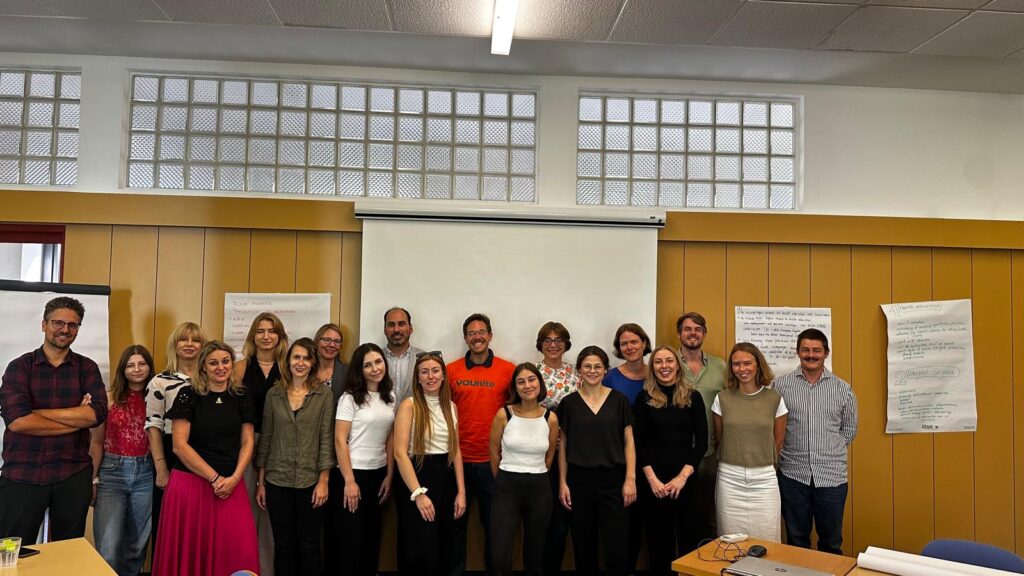Successful final Conference

The final conference of the YOUnite project, titled “Self-Esteem and Healthy Life Habits of Youth,” was a resounding success. Held on the 10th of September in Vienna, the event brought together stakeholders from across Europe to discuss and share insights into youth empowerment, focusing on fostering self-esteem, healthy living habits, and employability skills for overweight and obese youth.
The conference gathered a diverse range of participants from Austria, Finland, Poland, Hungary taking part in the project, but also interested youth experts from Spain, Slovakia and Germany as well. More than 50 people registered and 40 showed up at the conference, including youth workers, trainers, health professionals, educators, and policymakers. The conference provided a vital space to discuss and debate best tools and methods to approach youth obesity. Participants could also get a glimpse to the work done within the YOUnite project, which addressed not only the health issues associated with obesity but also the social and economic barriers that prevent young people from achieving their full potential. The event demonstrated the power of cross-sector collaboration in tackling complex issues like youth unemployment and social exclusion.
Participants from Austria, Finland, Hungary, and Poland gathered to exchange ideas, experiences, and success stories, creating a vibrant atmosphere of learning and collaboration. The conference’s agenda featured a mix of keynotes, panel discussions, and presentations that reflected the holistic approach of the YOUnite project, addressing both the psychological and physical health of vulnerable young people. The event allowed participants to delve into the challenges and results of the project, highlighting lessons learned from the transnational cooperation. The conference also provided a learning opportunity between project partners and invited speakers’ initiatives. The contribution of several esteemed speakers who brought valuable insights from their respective fields, adding depth and expertise to the discussions.
Konsta Lehtovuori opened the session by discussing societal pressures and the stereotypes young people face, particularly regarding body image. Lehtovuori provided insightful strategies for coping with these challenges, drawing attention to the harmful effects that such pressures can have on self-esteem and mental health. Dr. Manuel Schätzer of SIPCAN (the Austrian Institute for Preventive Medicine) provided a compelling presentation on reducing sugar consumption in schools. He advocated for large-scale preventive measures to combat obesity from a public health perspective, emphasizing that changing environments can positively influence youth health. Philipp Dörler, representing the AustbuildingsFit Do it initiative, shared practical experiences of empowering youth through hands-on health initiatives. Dörler showcased how active participation in fitness and wellness programs has helped young people build not only their physical health but also their confidence. Marlies Braun from Austria’s Frauengesundheitszentrum F.E.M. gave a powerful presentation on supporting vulnerable women. Braun’s talk broadened the scope of the conference by linking gender-specific issues to the broader theme of self-esteem and inclusion.
Miika Karppinen provided practical tools for young people to present themselves effectively in the labor market. His presentation focused on self-confidence and presentation skills, offering youth valuable techniques to improve their chances of securing employment. Karppinen’s session reinforced the importance of soft skills, such as communication and self-presentation, in achieving long-term success in the job market.
The afternoon sessions focused on the results and lessons learned from the YOUnite project, with a comparative evaluation presented by Julia Höllring from ÖSB Social Innovation. She provided an overview of the training challenges, processes, and outcomes across the participating countries—Austria, Finland, Hungary, and Poland. Höllring’s analysis gave a comprehensive understanding of how the project impacted different regions and highlighted the significance of local adaptation within a transnational framework.
The final conference was a fitting culmination of the YOUnite project, offering a platform for meaningful exchange between experts, youth workers, and organizations committed to empowering disadvantaged youth. The speakers’ contributions enriched the discussion, providing both theoretical and practical insights into how to foster healthier, more inclusive futures for young people across Europe. The project’s holistic approach, focusing on both self-esteem and physical health, proved to be a valuable model for supporting the integration of vulnerable youth into the labour market.




